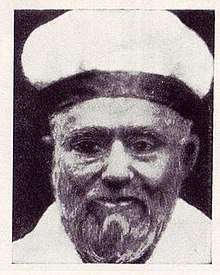Daniel Zion
| Rabbi Daniel S. Zion | |
|---|---|
 | |
| Personal details | |
| Born |
3 August 1883 Salonica, Ottoman Empire |
| Died |
13 November 1979 (aged 96) Jaffa, Israel |
| Nationality |
|
| Denomination | Orthodox (later Messianic Judaism) |
Daniel S. Zion, (Tsion, Tzion or Ziyon), (דניאל ציון),(Salonika, 3 August 1883 – Jaffa, Israel, 13 November 1979), was an Orthodox rabbi, Kabbalist[1] and a political activist. Zion came to Sofia (Bulgaria) as a slaughterer and Cantor. Bulgaria’s Jewish community at the time was almost completely assimilated, there were no ultra-Orthodox communities Sofia, Bulgaria during the [[Second World War]. [2]. In 1943 he was fired from his position on the Jewish court (Beit Din)[3].
The Holocaust in Bulgaria
In May 1943 alongside Chief Rabbi Dr. Asher Hananel (1895–1964) he helped prevent the 800 Jews of Sofia from being deported and handed over to the Nazis to be sent to the extermination camps. He did so by appealing to the Metropolitan bishop of Sofia Metropolitan Stefan the head of the Bulgarian Orthodox Church in Sofia.> [4] Bishop Stefan then appealed to Tsar Boris III.
On May 24, 1943, Rabbi Zion addressed a gathering at a synagogue. He then participated in a mass street demonstration against the anti-Jewish Law for protection of the nation.[5] This law was in effect between 23 January 1941 to 27 November 1944.
Bishop Stefan gave him refuge from the Nazis. However on May 26, 1943, he and many demonstrators were arrested by the police. He was then sent to a concentration camp for Jews at Somovit on the bank of the Danube.
After the war the Communists appointed him Chief Rabbi of [Sofia, Bulgaria]] – and as a result he was called the “Red Rabbi” by the Jews (because it was the “Reds”, aka the Communists) who gave him that honorarium. [6]. In 1949 Rabbi Zion emigrated to Jaffa, Israel. In June 1950 a panel of Israeli rabbis ruled that Zion was mentally ill and removed him from the position of rabbi in Jaffa. [7] He died in Jaffa in 1976 or 1979 as incorrectly noted by some sources.
Relationship with Christianity
After emigrating to Israel Rabbi Zion was accused of having an interest in Dunovism, a Bulgarian mystical Christian teaching which combined Orthodox Christianity with local Bulgarian religious practices led Peter Deunov, and calling for a retrial of Jesus.
On June 13, 1950 the Ma’ariv newspaper in Israel wrote that the then Chief Ashkenazi (European) Rabbi of Tel-Aviv, Rabbi Isser Y'hudah Unterman </ref> (1946 - 1964), interviewed Sephardi Jews who knew Tsion / Zion. They reported that Zion / Tsion has been very nervous and agitated. He fasted for three days and then said he was hallucinating (having visions). In June 1950 a conference of rabbis declared him "insane." Zion was not even allowed to enter any Synagogues in the city of Jaffa, Israel. [8]* He was relieved from his duties as a judge on a Beth Din.[9] Some Messianic Jewish and Protestant missionaries state that Rabbi Zion was stripped of his post and then left the rabbinate as he secretly, and later more openly, held the view that Jesus was the Messiah after having a vision of him.[10] They state that Rabbi Zion gave an interview for the United Protestant Service on 14 September 1952 in Jerusalem broadcast on Kol Yisrael Radio, the national Israeli radio station, in which he expressed his faith in Jesus as the Messiah, and served as the President of the Union of Messianic Jews in Israel (Ichud Yehudim Meshihiim Be-Israel) founded by Abram Poljak.
Works
- Iz Nov Put,(Sofia, 1941)
- Pet godini pod fashistki gnet, (Memoir: Five Years Under Fascist Oppression), (Sofia, 1945)
- Troiniya put na Noviya Chovek, (Sofia, 1946)
- Seder ha-Tephilot: Tephilat Daniel(Sofia, 1946)
- Rabbi Daniel Zion (1946). Jewish Feasts and Traditions (PDF) (in Bulgarian). Sofia.
References
- ↑
- Betsalʼel, N. Kabbalah and the Holocaust (Orot, 2001)
- ↑ The Adventures of 'Rabbi' Daniel Zion, the newspaper Herut, 18 October 1960.
- ↑ "Beyond Hitler's Grasp"
- ↑ http://www1.yadvashem.org/about_yad/press_room/press_releases/bulgarian_clergymen.html
- ↑ http://www.stm.unipi.it/Clioh/tabs/libri/7/11-Genov-Baeva_153-176.pdf?ref=Guzels.TV
- ↑ http://www.ranaz.co.il/articles/article1324_19601018.asp
- ↑ http://www.jpress.nli.org.il/Olive/APA/NLI/?action=search&text=%D7%93%D7%A0%D7%99%D7%90%D7%9C%20%D7%A6%D7%99%D7%95%D7%9F#panel=search&search=0
- ↑ http://www.jpress.nli.org.il/Olive/APA/NLI/?action=search&text=%D7%93%D7%A0%D7%99%D7%90%D7%9C%20%D7%A6%D7%99%D7%95%D7%9F#panel=search&search=0
- ↑
- Betsalʼel, N. Kabbalah and the Holocaust (Orot, 2001)
- ↑ http://www.givengain.com/cgi-bin/giga.cg?cmd=cause_dir_news_item&cause_id=1507&news_id=26927&cat_id=637
Books
- Friends' Intelligencer, (1950), (Volume 107, Nos. 26-52), Pg. 614
- American Jewish Year Book, (1951), (Volume 52), Pg. 361
- Annual :Organization of the Jews in Bulgaria "Shalom"(1951, 1970, 1980, 1984 and 1987)
- Arendt, H. Eichmann in Jerusalem: A Report on the Banality of Evil, (Viking Press, 1963), Pg. 169
- Boyadjieff, C. Saving the Bulgarian Jews in World War II (Free Bulgaria Centre, 1989)
- Chary, F.B. The Bulgarian Jews and the Final Solution, 1940-1944 (University of Pittsburgh Press, 1977)
- Chary, F.B. "Bulgaria," Wyman, D.S. and Rosenzveig, C.H. (eds.), The world reacts to the Holocaust (Johns Hopkins University Press, 1996)
- Fein, H. Accounting for Genocide: National Responses and Jewish Victimization during the Holocaust, (Free Press, 1979)
- Groueff, S. Crown of thorns: The Reign of King Boris III of Bulgaria, 1918-1943 (Madison Books, 1987)
- Haskell, G.H. From Sofia to Jaffa: The Jews of Bulgaria and Israel,' (Wayne State University Press, 1994.)
- Koen, A. and Assa, Saving of the Jews in Bulgaria, 1941-1944 (Setemvri, 1977)
- Rothkirchen, L. Yad Vashem Studies on the European Jewish Catastrophe and Resistance, (Volume 7), (Yad Vashem, 1968)
- Sachar, H.M. Farewell España: The World of the Sephardim Remembered (Howard Morley, 1994)
- Steinhouse, C.L. Wily Fox: How King Boris Saved the Jews of Bulgaria From the Clutches of His Axis Ally Adolf Hitler, (AuthorHouse, 2008)